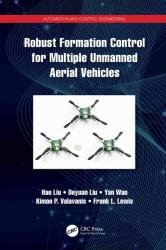Robust Formation Control for Multiple Unmanned Aerial Vehicles
- Добавил: literator
- Дата: 9-10-2022, 14:36
- Комментариев: 0
 Название: Robust Formation Control for Multiple Unmanned Aerial Vehicles
Название: Robust Formation Control for Multiple Unmanned Aerial VehiclesАвтор: Hao Liu, Deyuan Liu, Yan Wan, Kimon P. Valavanis
Издательство: CRC Press
Серия: Automation and Control Engineering
Год: 2023
Страниц: 145
Язык: английский
Формат: pdf (true)
Размер: 15.3 MB
This book is based on the authors’ recent research results on formation control problems, including time-varying formation, communication delays, fault-tolerant formation for multiple UAV systems with highly nonlinear and coupled, parameter uncertainties, and external disturbances.
Differentiating from existing works, this book presents a robust optimal formation approach to designing distributed cooperative control laws for a group of UAVs, based on the linear quadratic regulator control method and the robust compensation theory. The proposed control method is composed of two parts: the nominal part to achieve desired tracking performance and the robust compensation part to restrain the influence of highly nonlinear and strongly coupled parameter uncertainties, and external disturbances on the global closed-loop control system. Furthermore, this book gives proof of their robust properties. The influence of communication delays and actuator fault tolerance can be restrained by the proposed robust formation control protocol, and the formation tracking errors can converge into a neighborhood of the origin bounded by a given constant in a finite time. Moreover, the book provides details about the practical application of the proposed method to design formation control systems for multiple quadrotors and tail-sitters. Additional features include a robust control method that is proposed to address the formation control problem for UAVs and theoretical and experimental research for the cooperative flight of the quadrotor UAV group and the tail-sitter UAV group.
Unmanned Aerial Vehicles (UAVs) have various applications, such as surveillance, border patrol, building exploration, mapping, and inspection, where the operating environments can be dangerous and inaccessible. In practical applications, it is difficult for a single UAV to perform complex tasks, due to the limited endurance, load capacity, and coverage radius. Compared to a single aerial vehicle, multiple UAVs are capable to perform complex tasks, simultaneously, which can increase efficiency and provide redundancy against individual failures. Therefore, formation flight of a team of UAVs has attracted considerable attention in both the military and civil fields over the past two decades. It is significant for achieving the desired formation flying to design robust formation controllers.
There are multiple challenges for the robust formation controller design of a group of UAVs. The dynamics of UAVs is highly nonlinear and coupled. Multiple uncertainties such as unmodelled uncertainties, parametric perturbations, and external disturbances can affect the tracking performance of the flight control system. Furthermore, in practical applications, such as source seeking and target enclosing, the UAV formation is required to track the desired trajectory to perform the tasks while keeping the desired time-varying formation. Moreover, individual UAVs cooperate with others through communication for information sharing. During the information exchange, time delays inevitably exist, which may degrade the control performance of the formation and even destabilize the entire system. In addition, each UAV may be subject to certain actuator failures. In the framework of formation
control, the actuator failure in an individual UAV can spread over neighboring UAVs through the interaction topology and affect the performance of the whole system. All of the above issues make it difficult to achieve desired formation control performance for a group of UAVs.
This book is based on the authors’ recent research results on formation control problems, including time-varying formation, communication delays, and fault-tolerant formation, for multiple UAV systems with high nonlinearities, parameter uncertainties, and external disturbances. Different from the existing works, we present a robust optimal formation approach to design distributed cooperative control laws for a group of UAVs, based on the linear quadratic regulator (LQR) control method and the robust compensation theory. The proposed control method is composed of two parts: the nominal part to achieve desired tracking performance and the robust compensation part to restrain the influence of high nonlinearities, parameter uncertainties, and external disturbances on the global closed-loop control system. Furthermore, this book gives the proof of robust properties. The influence of communication delays and actuator fault tolerance can be restrained by the proposed robust formation control protocol, and the formation tracking errors can converge into a neighborhood of the origin bounded by a given constant in a finite time. Moreover, this book provides details about the practical applications of the proposed method to design formation control systems for multiple quadrotors and tail-sitters.
Robust Formation Control for Multiple Unmanned Aerial Vehicles is suitable for graduate students, researchers, and engineers in the system and control community, especially those engaged in the areas of robust control, UAV swarming, and multi-agent systems.
Скачать Robust Formation Control for Multiple Unmanned Aerial Vehicles
Внимание
Уважаемый посетитель, Вы зашли на сайт как незарегистрированный пользователь.
Мы рекомендуем Вам зарегистрироваться либо войти на сайт под своим именем.
Уважаемый посетитель, Вы зашли на сайт как незарегистрированный пользователь.
Мы рекомендуем Вам зарегистрироваться либо войти на сайт под своим именем.
Информация
Посетители, находящиеся в группе Гости, не могут оставлять комментарии к данной публикации.
Посетители, находящиеся в группе Гости, не могут оставлять комментарии к данной публикации.
